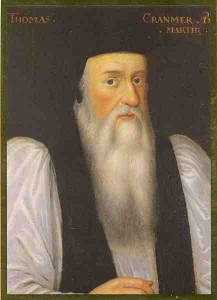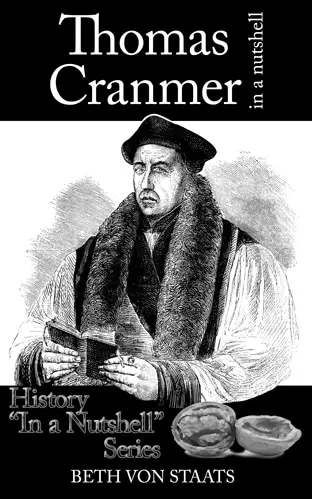 Every year on 21st March, I spare a thought (or actually quite a few!) for Thomas Cranmer, Archbishop of Canterbury during the reigns of Henry VIII and Edward VI, who was burnt at the stake on 21st March 1556 at Oxford. He has gone down in history as one of the Oxford Martyrs, along with Bishops Latimer and Ridley, one of the Protestant martyrs of Mary I’s reign.
Every year on 21st March, I spare a thought (or actually quite a few!) for Thomas Cranmer, Archbishop of Canterbury during the reigns of Henry VIII and Edward VI, who was burnt at the stake on 21st March 1556 at Oxford. He has gone down in history as one of the Oxford Martyrs, along with Bishops Latimer and Ridley, one of the Protestant martyrs of Mary I’s reign.
Thomas Cranmer had previously been found guilty of high treason and condemned to death in 1553, but instead was imprisoned and then tried for heresy with Hugh Latimer and Nicholas Ridley on 12th September 1555. Ridley and Latimer were found guilty immediately and were burnt at the stake on the 16th October 1555 but Cranmer had to wait for a final verdict from Rome. On the 4th December, Rome took the post of archbishop away from Cranmer and gave permission to the secular authorities to decide Cranmer’s sentence. His execution was then set for the beginning of March 1556.
This is when Cranmer’s story really hits me and reminds me, actually, of St Peter who denied Christ three times and yet was the rock on which Christ said he’d build his church. Like Peter, Cranmer denied his true faith by making five recantations and accepting Catholic theology, repudiating Reformist theology, stating that there was no salvation outside of the Catholic Church and announcing that he was happy to return to the Catholic fold. These actions should have resulted in Cranmer being absolved, but although his execution was postponed temporarily a new date was then set for 21st March.
On the day of his execution, Cranmer was told to make a final recantation, but in an act of defiance and as a testimony to his true faith he actually renounced his recantations and spoke out against the Pope as “Christ’s enemy, and antichrist, with all his false doctrine.”. He also said he would punish his hand for signing the recantations by putting it in the fire first. In his account of Cranmer’s execution, martyrologist John Foxe writes of how Cranmer did just this: “then it was, that stretching out his right hand, he held it unshrinkingly in the fire till it was burnt to a cinder, even before his body was injured, frequently exclaiming, “This unworthy right hand!””
He died courageously and as a martyr to his faith.
You can read more about Thomas Cranmer in the following articles:
- The Life of Archbishop Thomas Cranmer
- Thomas Cranmer becomes Archbishop of Canterbury
- The Unlawful Execution of Thomas Cranmer
And I’d highly recommend Beth von Staats’ book on Cranmer, Thomas Cranmer in a Nutshell, if you want to know even more about him.
